***
Australia 2011
Day 5 - 2nd August - Uluru Tour (Part 2)

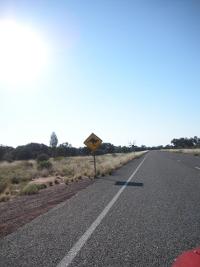
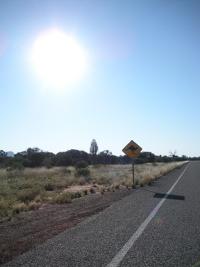
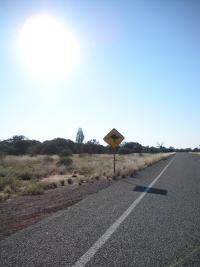
Kangaroo street sign
We then went to what was advertised as:
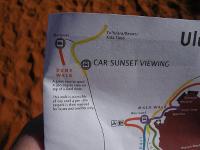
"Dune Walk. A great sunrise spot! A 360 degree view on top of a sand dune"
This was also the coach sunset viewing point, which seemed better than the one for cars (they knew their priorities).
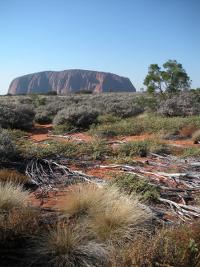
Uluru and brushwood
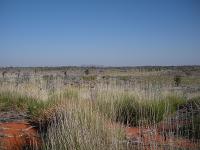
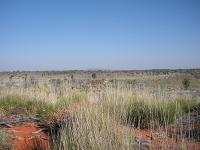
Kata Tjuta at distance
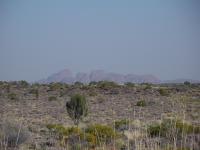
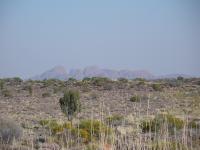
Kata Tjuta zoomed
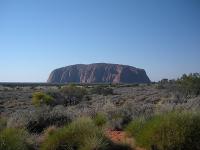
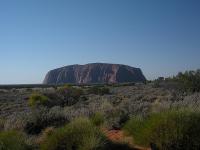
Uluru
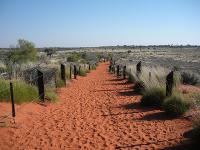
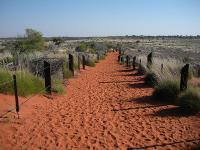
So-called Dune Walk. I felt cheated. There were also a lot of flies buzzing around and it was hard to put up with them.

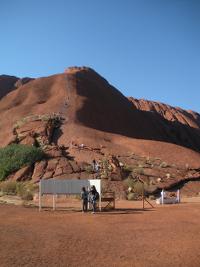
People climbing Ayer's Rock. It looked pretty safe, despite their claims (which I have already critically examined and debunked).
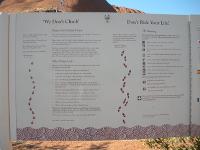
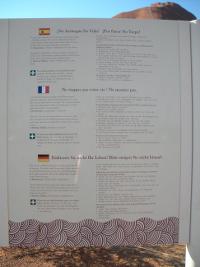
"We feel great sadness when a person dies or is hurt on our land. We worry about you and we worry about your family"
I hope they feel at least as sad when one of their own dies or is hurt while climbing it in a sacred ceremony.
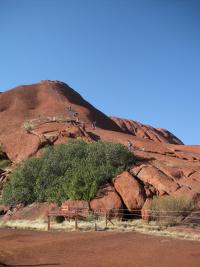
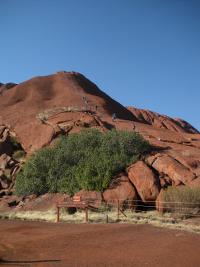
More climbing
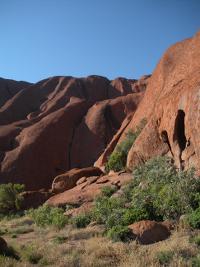
Side of Uluru
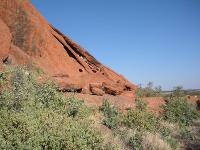

Side of Ayer's Rock
We then went for the Ranger Tour. Which we missed the start of, resulting in my not knowing that they didn't want to be filmed or photographed, and ended up doing the former. Oops (probably it's due to the taboo on images of dead people, so they're just thinking ahead). One does wonder how they deal with CCTV, though.
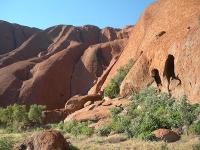
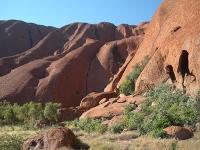

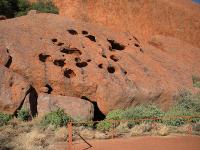
These holes were, according to the Aborigines, made by some animal-god jumping in and out of the rock.
The guides showed us this carved wooden object shaped like an upside-down shield placed on the head (with a wool object as cushioning - last time they used human hair). This was used to hold fruit and water.
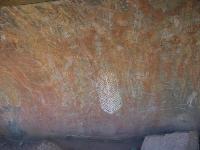
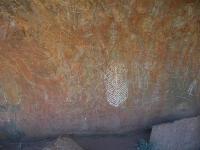
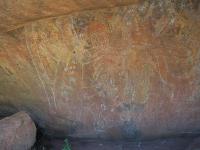
Aboriginal murals (for male teenagers during their ceremonies)
This is 30,000-50,000 year old rock art. The white leaf is some wheat-like plant. There're 4-5 layers of art, and as the light changes what you see changes. There's also a gecko there, besides the large one on the top left.
The concentric circles at the bottom right of one picture are Uluru and Kata Tjuta.
Murals view
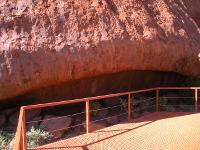
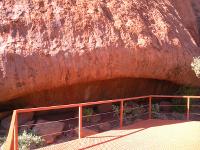
Viewing platform for murals
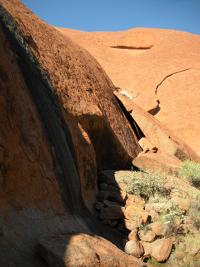
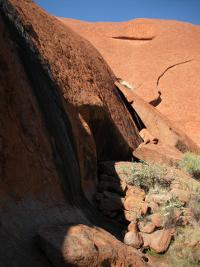
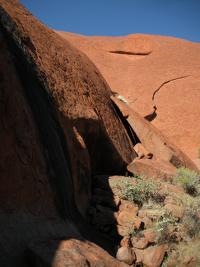
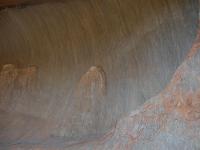
There was one part which was a sacred place, where we couldn't tread. Yet, one could extend the definition of "sacred", and take the whole area of Ayer's Rock and Mount Olga as sacred, and ban all outsiders from coming in (à la Mecca). Of course, besides the Australian government opposing this, there would be a loss of tourist revenue.
The sacred place we passed was the "Anangu Women's Sacred Site Mala Puta". To enter it attracted a maximum fine of $5,000, and a sign said "this cave is the pouch of the female hare-wallaby". I wondered if photography attracted a fine but decided not to risk it. We had 3 male guides so they said if a female guide were there, she'd take the ladies aside to tell them about it. So they're not racist - just sexist.
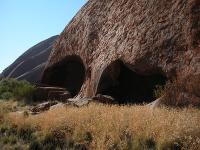
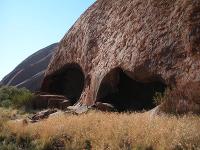
Cave. This is where the sexes were segregated in coming of age rituals "since time began". In other words since, according to racist, imperialist, ethnocentric Western "Science", the aborigines came to camp at Ayer's Rock

"Kurpany" (footprints of an evil dog created by one tribe to set on another)
This was inside another area of sexual segregation
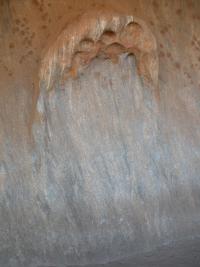

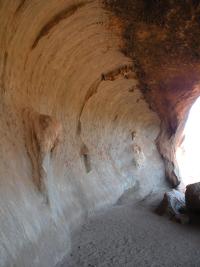
Inside a cave
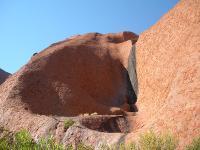
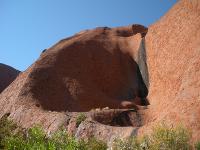
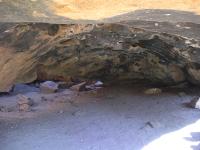

Cave for old people to chill, and MR taking photos
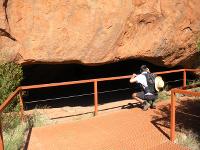
Someone else taking photos
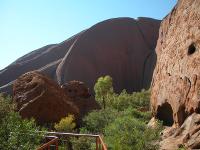
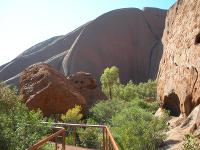
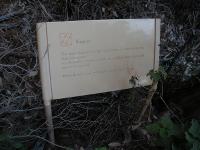
"Kantju" - a waterhole which is the main source of water during Mala ceremonies (Mala being one sort of wallaby)
Now people pee on the top of Ayer's Rock, and when it rains it carries the remnants of the urine into this watering hole (now I knew where the drinking water in the tank at the Visitor's Centre was from).
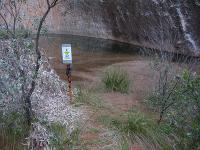
Waterhole
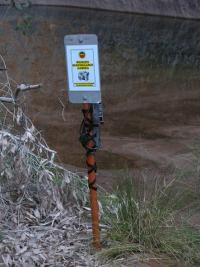
Surveillance camera
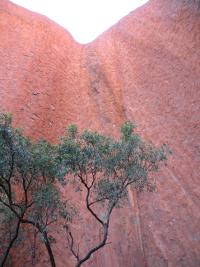

Wall down which the pee flows
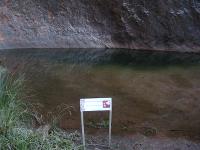
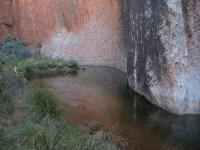
Waterhole
Waterhole

Waterhole
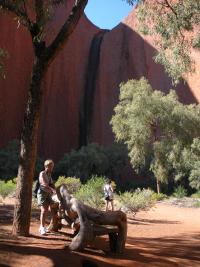

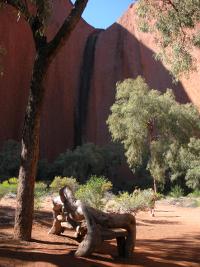
Waterhole
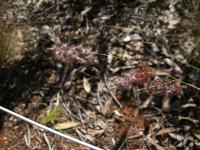
Plant


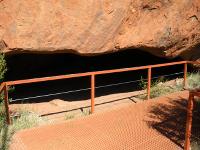
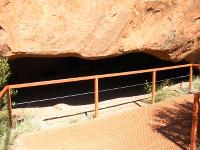
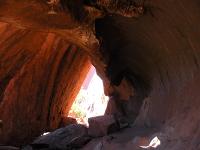
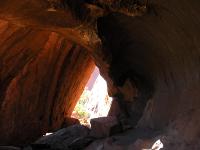
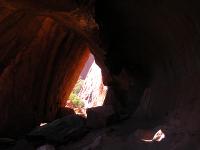
Cave
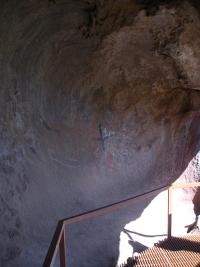
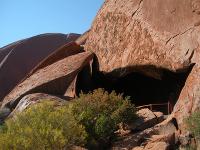
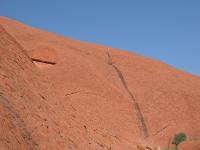
Solitary man climbing Ayer's Rock
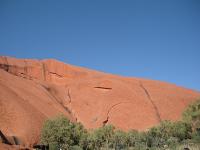
Tiny men climbing
Despite us seeing even 6 year old kids coming down Uluru, we had time constraints, it was the hottest time of day (noon), I had recently strained my back and I was tired (maybe MR was not), so we set off for our next destination: Kings Canyon.

"Celebration of a century 2013"
Post-dated license plate (this was in 2011)
The water in Melbourne was better - sweeter, purer and clearer. Here it tasted a bit metallic.
The whole thing about respecting people's beliefs is that we're just respecting the last people to be in that place. I'm very sure many aboriginal tribes had been in and out of this area, each according new (if not totally different) significances to the site. Add to that the fact that each previous tribe had probably been chased out with violence (probably the White Man's help was even enlisted sometimes), and we problematise the Romanticised oneness and unity of the Noble Savage, and how the White Man is the only bad thing that has ever happened to them (see the ludicrous assertion that "Prior to invasion, Aboriginal families had an ideal lifestyle" - see Pinker on the Myth of Violence, and studies on the short life expectancies of hunter-gatherers - which questions if the "unacceptable" discrepancy in life expectancies with non-aboriginal Australians is really so unacceptable). So essentially what we are "respecting" is merely the imagined identity of the latest in a long line of peoples.
While most people in the modern world take religion to be at least partially metaphorical (e.g. Creation Myths), the aborigines seem to have literal belief in myths such as the Dreamtime (or at least when we hear the Aboriginal Voice, it is associated with their traditional culture; those who have embraced modernity are Silenced). I wonder if this pre-modern worldview has anything to do with their social problems today. A rejection of modernity leads to difficulties integrating into modern society:
- magical thinking is not compatible with education, leading to problems finding and retaining employment
- any rejection of modern medicine would lead to health issues
- a non-modern conception of time might lead to problems showing up for work at a fixed time (besides leading to problems with psychiatric treatment
- not wanting to be photographed would lead to problems in situations when this is necessary for bureaucratic or corporate purposes (and thus with education and employment)


